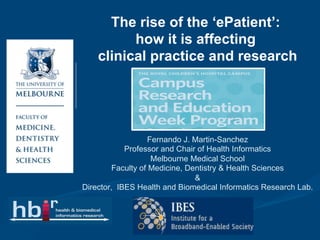Rise of e patient fjms
- 1. The rise of the âePatientâ: how it is affecting clinical practice and research Fernando J. Martin-Sanchez Professor and Chair of Health Informatics Melbourne Medical School Faculty of Medicine, Dentistry & Health Sciences & Director, IBES Health and Biomedical Informatics Research Lab.
- 3. âĒâŊPERSONALIZED PREVENTIVE HEALTH MAINTENANCE âĒâŊPARTICIPATORY MEDICINE âĒâŊPATIENT-CENTRED CARE âĒâŊDEMOCRATIZATION OF HEALTH INFORMATION
- 4. E-patients âĒâŊ Gimme my damn data! âĒâŊ The patient will see you nowâĶ âĒâŊ Let patients help âĒâŊ Nothing about me without me! âĒâŊ Dave de Bronkart âĒâŊ Regina Holliday âĒâŊ Hugo Campos âĒâŊ Salvatore Iaconesi âĒâŊ Marian Sandmaier
- 5. Participatory Health Regina Holliday
- 6. The Digitalization of Medicine âĒâŊ Digital  revolu-on  in  other  domains  (banking,  insurance,  leisure,  government,âĶ)  âĒâŊ The  incorpora-on  of  digital  systems  in  healthcare  is  lagging  behind  other  sectors:  ââŊ Reasons:  complexity,  privacy,  volume  of  data,  lack  of  demand  ââŊ It  has  greatly  aïŽected  healthcare  at  the  hospital  or  research  centre  level.   ââŊ The  digital  revolu-on  has  not  yet  reached  medicine  at  the  pa-ent/ ci-zen  level   âĒâŊBUT  THIS  IS  STARTING  TO  HAPPEN  NOW  !!! Â
- 7. Participatory Health à ï Patients empowered, informed and involved in decision making, prevention and learning self tracking devices Social networks games Participatory Health mobile Internet of things sensors PCEHR
- 8. Participatory health âĒâŊ Personal genomics âĒâŊ Personal diagnostic testing âĒâŊ Personal health records âĒâŊ Personal medical images management âĒâŊ Patient reading physicianâs notes âĒâŊ Patient-initiated clinical trials âĒâŊ Patient reported outcomes measurement âĒâŊ Sensors for Self-monitoring and self-quantifying âĒâŊ Shared decision making
- 10. Personal diagnostic testing âĒâŊ âTest at home, treat onlineâ âĒâŊ Urinary tract infection, strep throat, flu, cholesterol, Lyme disease, Mono, sexually transmitted diseases, pregnancy, yeast infections and others. âĒâŊ (Not yet evaluated by regulatory agencies)
- 11. Personal Health Records Australian PCEHR
- 12. Personal medical image management
- 13. Open Notes â Patients reading Doctorâs notes
- 14. Crowdsourced clinical trials âĒâŊ Clinical Research with the patients, not on the patients âĒâŊ Examples ââŊ 23andMe â Parkinsonâs Disease â PLoS Genetics, 2 new genetic associations ââŊ PatientsLikeMe â Nature Biotech. Self-reported data from 600 patients on the use of lithium for Amyotrophic Lateral Sclerosis (ALS) ââŊ Acor, RevolutionHealth, Curetogether, Genomera, Althea Health
- 15. Patient reported outcomes âĒâŊ Health services and outcomes research âĒâŊ Measuring quality of care from the patient perspective NHS PROMs NIH
- 16. âĒâŊ Self tracking / self quantifying / self monitoring âĒâŊ The belief that gathering and analysing data can help them improve their lives! âĒâŊ QSâers doubling every year.â 10K members, 65 meetup groups âĒâŊ Larry Smarrâ 10years quantifying his body ââŊ Weight â physical activity: calories burnt (body media) â Food intake â Sleep (Zeo) â blood chemicals (60 Markers) â cholesterol/triglycerides / Apo B / ÎĐ â 6, ÎĐ â 3/ C-reactive protein - Ultrasound â (plaque in arteries) â stool test â colonoscopy â DNA â Microbiome âĒâŊ Fitbit â Sleep â Movement âĒâŊ NODE Sensor Environment
- 17. Sensors for data collection Environmental sensors Genomic sensors Phenomic sensors Environmental risk factors Biomarkers (DNA sequence, (pollution, radiation, toxic agents, âĶ) proteins, gene expression, epigenetics Physiological, biochemical parameters (cholesterol, temperature, glucose, heart rateâĶ) Integrated personal health record
- 21. Interpretation of personal genome
- 22. Shared decision support systems
- 23. Social Media for clinical guideline development
- 24. Apps for health - Appatient Stress Glucose ECG Heart rate temperature Diet Saturation Drug reminder LifeWatch V
- 25. Participatory Health â Self-Omics (funded by IBES)
- 26. Participatory Health â Social media !
- 27. Visualising personal health risks profiles (Juhan Sonin, MIT) (Univ. Missouri)
- 28. GIS for Personal Health Information disease Acute Spatial Location Exposome Symptoms / Chronic disease EHR Body location Microbiome Epigenome disease Time Acute Genome Volume of data Data Types
- 30. BIG DATA â Melbourne April 2013
- 31. Issues Pros Cons âĒâŊ Motivation âĒâŊ Privacy âĒâŊ Deepening understanding âĒâŊ Security of their health âĒâŊ Education âĒâŊ Self-improvement âĒâŊ Cyberchondria âĒâŊ Risk profiling âĒâŊ Equity âĒâŊ Prevention âĒâŊ Regulation, accreditation âĒâŊ Shift terciary à ï secondary âĒâŊ Role of the clinician à ï primary à ï home care âĒâŊ Infrastructure needs âĒâŊ Data donors for research âĒâŊ Therapeutic gap (ethics)
- 32. Dr. Charles Safran, AMIA
- 34. UoM offer of HBI studies â Feb 2011 Subjects (image processing , genomics) MD Masters at MDHS Master Master Master Master (Public Health, âĶ) of IS of IT of of Bio- Biomedical Graduate informatics engineering Undergraduate Major in infor- Bachelor matics Bachelor of Science of Biomedicine 34
- 35. UoM education strategy in HBI Master of Bio- 5 PhD in Health Informatics6 informatics 2 Lectures 1 2 New 3 7 Subjects (image subjects New stream processing, Subjects or HBI eHBIs & genomics) on Health stream Content eHBIm IT MD Masters at MDHS Master Master New Masters Master (Public Health, Nursing) of IS of IT (Cancer, of Biomedical Ageing, engineering Graduate Information) Undergraduate 4 Honours Major in infor New major in Bachelor matics health informatics Bachelor of Science of Biomedicine Lectures
- 36. Thank you for your attention! ÂĐ Copyright The University of Melbourne 2012




































